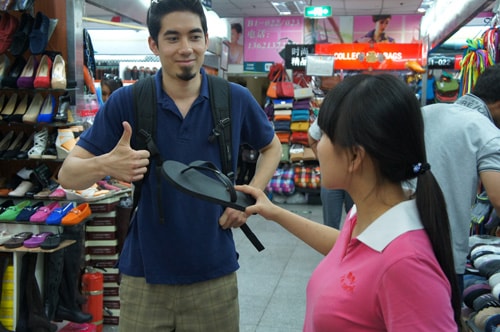Tips and Phrases for Bargaining - 讲价 jiǎng jià
China is a fantastic destination for shopping. From the roadside shops to the dazzling modern shopping mall, from the common store to a popular supermarket, China has numerous perfect places to do shopping.
However, if you want to get the best in both quality and price, you first need to know how to 讲价 (jiǎng jià), to bargain in Mandarin Chinese! You can do it without being able to speak Chinese though, but a little Chinese will surely make the bargaining more effective and earn you some respect from the shop keepers.

Bargaining Is Popular in China
Where Can You Bargain in China?
Bargaining is like a culture in China. It is acceptable in most cases, especially near the tourist spots where there are many tourists. However, you can’t bargain in places where products are marked with fixed price, or the owner clearly put up a sign “不讲价 (bù jiǎnɡ jià)”, “一口价 (yì kǒu jià)” or “谢绝讲价 (xiè jué jiǎng jià)”, all of which mean“No Bargaining”. DON’T expect to bargain at any large stores, corporate chains, or department stores. The fact is that the employees have neither the authority nor incentive to haggle with you.

No Bargaining
Best Tips for Bargaining in China
First of all, if time allows, you should visit many different shops and markets to get a general idea about the reasonable average price of the things you want to buy. And make sure to have a price in mind first and wait as absolutely long as possible before even mentioning a number.
Second, don’t show your interest, because once you appear too attached to the item you want to buy, you are in a disadvantage for the haggling. The shop keeper will be able to tell that you really want it, and you'll have a harder time not making concessions on the price. In a word, start as slow as you can!

Bargaining With the Shop Owner
Third, this may sound a little crazy, but in some small or informal markets, especially near tourist sites, cut 50% or at least 30% of the asking price. For example, if you have found a souvenir which the shop keeper asked RM100 from you, start at RMB 50 or lower.
Finally, the walk-away triumph! If your heart is set on an item, but you haven’t reached an agreement on the price, you can try the last trump card – simply walk away! Walking away to make it seem like you don’t want something is always a good tool to keep with you. Most of the time, the seller will call you back and say “Hey buddy, you know what, you win!”
Chinese Phrases for Bargaining
这个 多少 钱?
How much is this?
太贵了!
It's too expensive!
可以 便宜 点儿 吗?
Can you make this a little cheaper?
可以 再 便宜 点儿 吗?
Can you make this cheaper again?
二十块 怎么样?
How about 20 yuan?
我不要, 谢谢!
I don't want it. Thanks!
Experience Your First Class!
Get a 30-minute FREE trial to see what our online classes look like.
Apply Now







